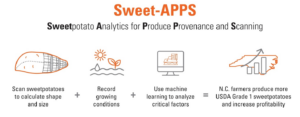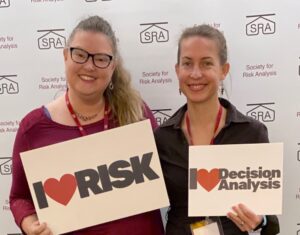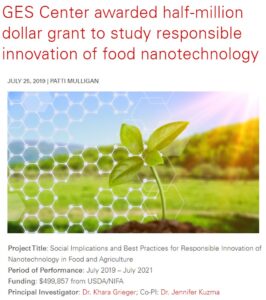Research Areas and Grants
Interdisciplinary Approaches to Evaluate Societal Implications and Foster Sustainability of Genetic Engineering and Nanotechnology in Food and Agriculture (2022-2026)
- Description: This grant evaluates the societal implications of genetic engineering (GE) and nanotechnology used in food and agriculture and identifies strategies to ensure their sustainable futures according to diverse perspectives. Key project outcomes include i) benefit-risk evaluations of GE- and nano-agrifoods, ii) stakeholder perceptions of GE- and nano-agrifoods and how well they align with sustainable agrifood systems, and iii) interdisciplinary education and training approaches to strengthen evaluations of societal implications of novel agrifood technologies.
 Grieger, K.D. (PI); Kuzma, J. (Co-PI)
Grieger, K.D. (PI); Kuzma, J. (Co-PI)- USDA/NIFA. $649,515
- Jan 2022-Jan 2026
- NC State Announcement
Science and Technologies for Phosphorus Sustainability (STEP) Center (2021-2026)
- Description: The Science and Technologies for Phosphorus Sustainability (STEPS) Center is a convergence research community of diverse and leading scientists that addresses the complex challenges in phosphorus sustainability by integrating disciplinary contributions across the physical, life, social, and economic sciences. STEPS draws from atomic and molecular insights (e.g., chemistry, materials research, biochemistry, bioengineering) to develop materials and technologies that are deployed at the human scale (e.g., environmental and agricultural engineering, plant biology, crop and soil sciences) while considering supply-chain logistics, life cycle, and other regional and global issues (e.g., ecology, economics, sociology, policy). STEPS further leverages disciplinary contributions that transcend length scales and serve as integration mechanisms within the Center (e.g., science of team science, data science).
- Jones, J. (Director); Grieger, K. (Knowledge Transfer Co-Director)
- NSF. $25M
- Oct. 2021-Sept. 2026
- STEPS Center
- NC State announcement on Knowledge Transfer
Social Implication and Best Practices for Responsible Innovation of Nanotechnology in Food and Agriculture (2019-2022)
- Description: This grant evaluates the social implications of and identifies best practices for responsible innovation of nanomaterials used in food and agriculture sectors. Key project outcomes include critical information on i) practices of responsible innovation that can help ensure sustainability of nano-agrifoods and build trust, ii) stakeholder concerns of nano-agrifoods and approaches to address them, and iii) key lessons learned from nano-agrifoods that help ensure sustainability of other novel agrifood technologies.
- Grieger, K.D. (PI); Kuzma, J. (Co-PI)
- USDA/NIFA. $499,856
- July 2019-Jan 2022
- NC State announcement
Improving Crop Productivity and Value Through Heterogeneous Data Integration, Analytics, and Decision Support Platforms (Sweet-APPS) (2020 – 2023)

- Description: This NC State, GRIP4PSI funded project advances fundamental and applied research, transdisciplinary training, and stakeholder engagement opportunities associated with the North Carolina Plant Science Initiative at NC State.
- Grieger, K.D. (Co-PI); Williams, C. (PI)
- NC State. $550,000
- July 2020 – June 2023
- Sweet-APPS project website; NC State GRIP4PSI projects
Cultivating A Resilient Workforce By Integrating A Culturally Competent Community of Scholarship & Data Science in Food & Agricultural Research (2021 – 2023)
- Description: This grant aims to recruit, train, and mentor a cohort of PhD students from historically underrepresented groups in agricultural data science.
- USDA/NIFA. $238,500
- Grieger, K.D. (Co-PI); Jones, D (PI)
- 2021-2023
- Details here
Implications of Solar Radiation Management for Strategic Behavior and Climate Governance (2020-2023)
-
- Description: This grant develops and analyzes a game theoretic model of the dynamics of international cooperation when some nations have the ability to implement solar radiation management as a geoengineering technology in response to climate change. This grant also tests our model against actual behavior, and ultimately investigates cooperative strategies for climate engineering governance.
- NSF. $565,872
- Grieger, K (team member); PI=Borsuk (Duke University).
- April 2020-March 2023
- Project website
Society for Risk Analysis Strategic Initiative (2019 – 2022)
- Description: This grant develops a cost-effective approach to grow and expand the fields of risk sciences in the RTP area of North Carolina through funding provided by the Society for Risk Analysis. Key outcomes include: i) reinvigorating the local RTP regional organization of SRA, ii) enhancing and strengthening risk sciences through networking and guest lectures, and iii) growing and promoting risk sciences through professional development opportunities.
 Dr. Grieger (right) and risk-science colleagues at SRA
Dr. Grieger (right) and risk-science colleagues at SRA - Grieger, K.D. (PI)
- Society for Risk Analysis (SRA). $20,000
- September 2019 -February 2022
- SRA announcement
- SRA-Research Triangle Regional Organization
Biotechnology Risk Assessment Grant Program (2020-2022)
- Description: This conference grant aims to inform risk assessment research strategies for gene drive agricultural applications through interdisciplinary dialogue and exchange with diverse experts.
- Grieger, K.D. (Co-PI); Barnhill-Dilling, K. (PI)
- USDA/NIFA. $25,000
- September 2020-February 2022

